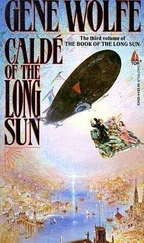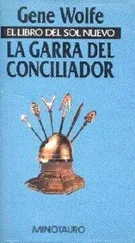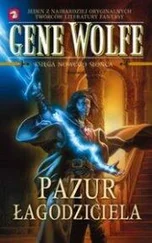Gene Wolfe - On Blue's waters
Здесь есть возможность читать онлайн «Gene Wolfe - On Blue's waters» весь текст электронной книги совершенно бесплатно (целиком полную версию без сокращений). В некоторых случаях можно слушать аудио, скачать через торрент в формате fb2 и присутствует краткое содержание. Год выпуска: 2000, ISBN: 2000, Издательство: Macmillan, Жанр: Фантастика и фэнтези, на английском языке. Описание произведения, (предисловие) а так же отзывы посетителей доступны на портале библиотеки ЛибКат.
- Название:On Blue's waters
- Автор:
- Издательство:Macmillan
- Жанр:
- Год:2000
- ISBN:9780312872571
- Рейтинг книги:4 / 5. Голосов: 1
-
Избранное:Добавить в избранное
- Отзывы:
-
Ваша оценка:
- 80
- 1
- 2
- 3
- 4
- 5
On Blue's waters: краткое содержание, описание и аннотация
Предлагаем к чтению аннотацию, описание, краткое содержание или предисловие (зависит от того, что написал сам автор книги «On Blue's waters»). Если вы не нашли необходимую информацию о книге — напишите в комментариях, мы постараемся отыскать её.
On Blue's waters — читать онлайн бесплатно полную книгу (весь текст) целиком
Ниже представлен текст книги, разбитый по страницам. Система сохранения места последней прочитанной страницы, позволяет с удобством читать онлайн бесплатно книгу «On Blue's waters», без необходимости каждый раз заново искать на чём Вы остановились. Поставьте закладку, и сможете в любой момент перейти на страницу, на которой закончили чтение.
Интервал:
Закладка:
One should also bring needles and thread with which to repair one’s clothing. I was fortunate in that I had several of the large needles I used to sew sails and a big ball of coarse linen thread. Finer needles and finer thread would be advisable, to-as well as a pair of scissors.
With boat’s stores I was tolerably well provided. The second anchor I had bought in New Viron, particularly, proved invaluable. I had also laid in a bolt of sailcloth, tar, varnish, and paint, and came to regret that there was not more of all four. There cannot be too much rope on a boat bound on a trip of great duration.
After the first fork, the current became our chief obstacle, and one about which we could do very little. Even on the lower reaches, where it was almost undetectable, it would slowly bear the sloop backward toward Wichote, although the water appeared quite motionless. After the first fork, we had to creep along very near one bank or the other, which meant we could not tack. We had to wait for a good, strong wind not worse than quartering, or crawl forward with the sweeps. On more than one occasion, and more than two, we thus waited and crawled and waited again for days at a time. There were even times when I walked three hundred strides upriver (that being the greatest distance that we had rope for) and hitched a block to a tree, after which we hauled the sloop forward-”we” being Babbie and I, very largely. I do not recall a good, strong, favoring wind that lasted a full day during the entire trip.
In the long hours of idleness Seawrack and I became more intimate than we had ever been before, more intimate even than we had been during those first idyllic days when her poor stump of arm had not yet healed and she used to confide to me that the fingers she no longer possessed touched something hard or soft, smooth or rough.
There was none of that now; if those soft and graceful phantom fingers groped or stroked anything, I was not apprised of it; but she talked about her life beneath the sea, of people she had known and liked or known and feared there (not all or even most of them actual, I believe), the freshwater springs on the seafloor at which she had drunk, the pranks she had played upon unsuspecting men in boats, and the pets she had adopted but eventually discarded, lost, or eaten.
“It seemed completely normal to me then,” she said, and I knew in my heart that it still did-that it was her life aboard the sloop with me that seemed the aberration. “I knew most people lived on the land, and I think I knew, somewhere behind my ears, that I had too, a long time ago. It wasn’t something I thought a lot about.”
She was silent for a moment, staring out at the last gleams of sunshine on the water.
“There were certain places around Mother where I slept, and I would go into them when it got dark. The sea is more dangerous after dark. So often you don’t see hungry things until you bump into them, or they bump into you, and a lot of those hungry things have ways of seeing in the dark with noises that I can’t do.”
She seemed to catch her breath, scanning the forest shadows. “So when it got dark I would go into one of my sleeping places. The water was always warm and still in them, with Mother’s smell in it. I’d curl up and go to sleep, knowing that Mother was so big that nothing frightened her, and that most of the dangerous things and people were afraid of her. You probably think it was awful. But it wasn’t awful, not then. It was really very, very nice.”
Babbie stretched out beside her, resting his chin on her thigh and looking up at her with eyes like two dark red beads that tried terribly hard to melt, although they had been made for maniacal ferocity.
“The land was like that for me, when I thought about it at all. Like the dark, I mean. I felt that it was always dark up there, and the people there weren’t really people at all, that they weren’t really people. Mother wasn’t human, though. Isn’t that what you say?” Feeling very much like Babbie, I nodded.
“She always seemed human to me. She still does, and I think it’s because in the sea being people means something different. In the sea, it’s talking. If you talk, you are a person, so she was and so was I, because in the sea there’s a lot of noise but not very many talking voices. In a place like that town where we stayed waiting for market day, there are so many people talking all the time that nobody wants to hear any more talk. After that, being human becomes something else, like walking on your hind feet.”
I smiled. “Human chickens?”
“And having two arms and two hands instead of wings. So I’m almost human. Isn’t that right?” She began to comb her long, golden hair, holding the comb in her mouth when she needed her hand for other matters.
“Your hair changes color,” I told her.
“When it’s wet. It looks black then.”
“No, it doesn’t. When it’s wet it’s a tawny gold, like the beautiful old gold you wore for me when you first came on board.”
She laughed, pleased. “But when I go down deep, it’s black.”
“If you go down deep enough, I suppose it must be. But now it’s changing color, and every color is more beautiful than the last, and makes me forget the last and wish that it would stay the new color always.”
I watched the comb, and the shimmering highlights it left behind. “There’s gold so pale that it’s almost like silver, like this ring you gave me, and pure yellow gold, and red gold, and even the tawny color your hair has when it’s wet-the color I thought it was for the first few days.”
“I was still spending a lot of time in the water then,” she said pensively.
“I know. And now you’re afraid of it, even when you catch fish for us. I see you nerving yourself to go in, to take the plunge as people say.”
“I’m not afraid I’ll drown, Horn. I never, ever will. Sometimes I wish I could.”
Obtuse though I was, I knew what she meant. “You’d die.” I tried to make my voice gentle. “Isn’t that worse than going back to your old life in the sea?”
We watched Krait haul on the painter to bring the sloop nearer shore, then walk out onto the bowsprit, jump down, and vanish among the crowding trees. The sun was sinking behind the mountains already, wrapping the river that had become our whorl in silent purple shadows.
“He’s one, isn’t he?” Seawrack sighed, put away her comb.
“One what?”
“One of the things that hunt through the night, the things I was so frightened of when I slept in Mother.”
Not knowing what to say, I did not reply.
“There was a cave in the rocks that I used to play in. I’ve probably told you.”
I nodded.
“I used to say I was going to sleep in there.” She laughed again, softly. “I was always really brave in the daytime. But when the dark started coming up out of the deep places, I would swim back to Mother as fast as I could and sleep in one of the places where I’d been sleeping ever since I was little. I knew what a lot of the things out there in the dark were, even if I didn’t have names for them, and just this moment it came into my head that Krait is one of those, even if I don’t have any name except Krait.”
I said, “I see,” although I was not sure I did.
“He sleeps all day, more than Babbie, even, and he hardly ever eats anything. Then at night he hunts, and he must eat everything he catches, because he never brings us back anything.”
“Sometimes he does,” I objected.
“That little crabbit.” Contemptuously, she waved the crabbit aside. “He seems like a human person to me, but he doesn’t to you.”
It caught me completely off guard. I did not know what to say.
“He has two hands and two arms, and he walks standing up. He talks more than both of us together when he’s awake. So why don’t you think he’s people?”
Читать дальшеИнтервал:
Закладка:
Похожие книги на «On Blue's waters»
Представляем Вашему вниманию похожие книги на «On Blue's waters» списком для выбора. Мы отобрали схожую по названию и смыслу литературу в надежде предоставить читателям больше вариантов отыскать новые, интересные, ещё непрочитанные произведения.
Обсуждение, отзывы о книге «On Blue's waters» и просто собственные мнения читателей. Оставьте ваши комментарии, напишите, что Вы думаете о произведении, его смысле или главных героях. Укажите что конкретно понравилось, а что нет, и почему Вы так считаете.











